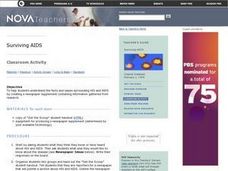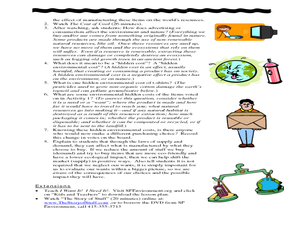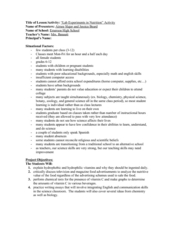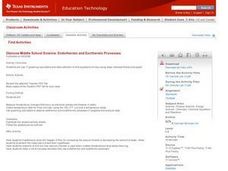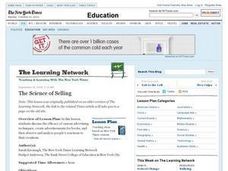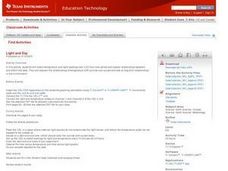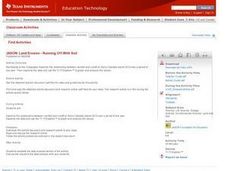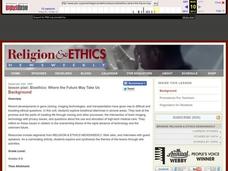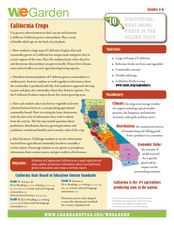Teach Engineering
Thinking Green!
Encourage your class to solve local environmental issues. Groups brainstorm environmental issues that are affecting the community, choose one they want to solve, and design a product or service to solve their chosen issue. They then...
Curated OER
Surviving AIDS
Enhance your middle and high schoolers' research skills with this lesson. After viewing a video clip about HIV and AIDS, high schoolers identify the facts and issues surrounding the disease. They work together to create a newspaper...
Curated OER
Quality Control at Kality Krunchers Dill Pickle Factory
In a hypothetical scenario, food chemists use titration to concoct a brine solution for producing the crunchiest pickles. They also analyze store-bought pickle juices. In addition to reinforcing titration techniques, the instructional...
Curated OER
The True "Cost of Cool!"
Eighth graders study hidden environmental costs in things we buy. For this consumerism lesson students watch a video about consumerism and analyze advertisements in teen magazines.
Curated OER
Full Circle Advertising: A Look at Teen Alcohol Use and Fetal Alcohol Syndrome
High schoolers analyze ads and learn about the effects of alcohol. Note that the PowerPoint mentioned in the procedure is not included, so you will need to prepare your own presentation. After the lecture, segue into fetal alcohol...
Curated OER
Lab Experiments in Nutrition Activity
Which vitamins should be ingested daily for maximum nutrition? Learners with ispecial needs or those who are pregnant focused on television and magazines advertisements that are used to sell food products. They conduct experiments and...
Beyond Benign
The Green Zine
It's time for your class to advertise what they've learned! The culminating lesson in the 24-part series asks scholars to use their newfound chemistry knowledge to create advertisements. Their magazine advertisements describe the health...
Curated OER
Nutria And The Disappearing Marsh
Young analysts examine changes in the nutria population, vegetation density, and marsh area over time in the wetlands of Louisiana. They import data and use the TI-73 Explorer to graph and analyze the effects of nutria on marsh loss.
Texas Instruments
Endothermic and Exothermic Processes
Young scholars investigate temperature using the TI. In this chemistry lesson, students analyze the change in temperature, as chemicals are dissolved in water. They analyze data collected using the CBL 2.
Curated OER
Titration: Standardization of a Base and Analysis of Stomach Antacid Tablets
Titration experiments don't have to give your high schoolers a stomachache. Study the ways to titrate an acide with a base in an engaging science experiment, which involves creating solutions and performing titrations. Pupils...
Curated OER
The Science of Selling
Students discuss advertisements and techniques they have discovered. They read an article about the science of selling and create an advertisement of their own to sell a book. They record people's reactions to their advertisement and...
Curated OER
Energy Content of Foods
Learners collect data, organize and analyze the data and compare it to real life scenarios. This assignment requires two class periods.
Texas Instruments
Light and Day
Pupils explore the concept of collecting data as they collect data on their graphing calculator about time, temperature, and light. Learners plot the data and create histograms and box and whisker plots to analyze the data.
Curated OER
Health of Aquatic Life a Real Problem
Learners explore the health of aquatic life in this science instructional activity They measure and track the oxygen level in the water to determine the health of the aquatic life. They collect this data using the TI explorer to graph...
Curated OER
Land Erosion - Does Vegetation Matter?
Young learners explore erosion, deposition, weather and climate in this science lesson. They discuss the cause of erosion, collect data and analyze it suing the TI Explorer. They can also use the TI CBL or Vernier LabPro for this...
Texas Instruments
Land Erosion - Running Off With Soil
Learners evaluate the relationship between rainfall and runoff of a small island for one year. In this rainfall vs. runoff lesson, learners analyze the relationship between the rainfall and the runoff on Barro Colorado Island over a...
Curated OER
Bioethics: Where the Future May Take Us
Learners analyze ethical issues related to technology, medicine, and reproduction. In this ethics lesson, students research selected bioethics issues and discuss their risks and benefits. Learners present their research findings to their...
Curated OER
California Crops
Young scholars explore agriculture by researching the native food crops of California. Students define a list of agriculture vocabulary terms and analyze maps of California which explain which foods come from which area. Young scholars...
Curated OER
Personal Ads
Students study advertisements from the 'H.I.V Stops with Me' Web site and develop similar theme-based advertisements geared specifically toward an H.I.V.-positive teenage audience.
Curated OER
Samples and Stats
Young scholars explore different methods of taking surveys and conducting polls and examine these methods for bias. They design and administer a sample survey, analyze the data and present their findings to the class.
Curated OER
The Aerial Age
Students infer America's attitude towards aviation in the early 1900s. In this The Aerial Age lesson, students analyze early 1900s literature, music, advertisements, and popular culture in reference to aviation. Students represent their...
Curated OER
Hazard Mitigation: Bioterrorism
Students discuss different ways to spread infectious diseases. In this bioterrorism lesson, students model the rate of smoke emission using CalRoad software. They analyze the effects of airborne release of biological...
Curated OER
Biodiesel: An Alternative Fuel Source
Students explore the advances that are being made in alternative fuels.In this biodiesel lesson students evaluate different petroleum and alternative fuels.
Curated OER
Threats to Validity
Students review the components of the scientific habits of mind. In groups, they use this information and relate it to scientific investigations. They develop strategies to evaluate information and evidence and how to question sources...

